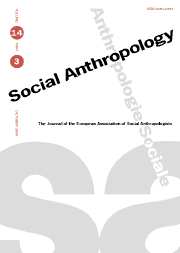No CrossRef data available.
Article contents
Introduction. Re-defining Europe: perspectives from socio-cultural anthropology
Published online by Cambridge University Press: 10 July 2006
Extract
This section, ‘Re-defining Europe: perspectives from socio-cultural anthropology’ is the outcome of the plenary panel of the same title, convened at the eighth conference of the European Association of Social Anthropologists in Vienna, in September 2004. The essays' common frame of reference is given by the complex and contradictory processes of transformation and redefinition that Europe is currently going through. Juergen Habermas (2001) observed that the most recent phase in these processes, after years of post-communist priorities for explicit market economy values, may be characterised by a ‘return of the political’, which has shaped global processes in a number of unprecedented, complex and tragic forms since 11 September 2001. If Habermas's diagnosis is accepted with certain qualifications, these renewed political aspects also contribute in new ways to the manner in which Europeans redefine themselves, as much as they are being re-defined by others. In view of these heterogeneous forms of re-defining Europe on all levels, this may indeed be the right moment also to re-examine established and somewhat worn-out notions and concepts of identity itself (Baumann and Gingrich 2004). The contested processes of re-defining Europe are profoundly shaped by those new global contexts of the present Habermas was referring to. Opposing or supporting the American-led coalition presence in Iraq, promoting or criticising negotiations with potential new European Union member countries or choosing one or other position with regard to an EU constitution: all these important decisions, struggles and debates concern the future of Europe, the future of identities in Europe and the positioning of Europe in shifting global contexts.
- Type
- Special section
- Information
- Copyright
- © Cambridge University Press 2006




